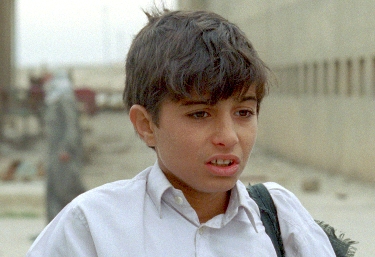Sons of Babylon is not a true story, but the story is true. The actors are not acting, because they're not real actors. A film from Iraq, yet Iraq's film industry is dead. Lines are impossible in Sons of Babylon, except the line between the living and the dead. Actually, not even that line exists.
Three weeks after the fall of Saddam Hussein, Ahmed, an engaging 12 year old boy, played beautifully by Yasser Talib, and his grandmother, a listless, self-absorbed woman in constant mourning, played by Shazda Hussein -- who draws upon her own tragic life for her role --, travel from Kurdistan in the north of Iraq to Nasiriyah in the south.

They walk and ride in pick-up trucks and on buses through an Iraq in heavy turmoil. The government has fallen and US troops are battling the remnants of Hussein's Republican Guard. Finally they arrive at the last known address of the boy's father and the old woman's son, the prison in Nasiriyah.
Amongst hysterical wailing women clad in long black robes, they are told there is no record of their father-son. The devastated pair is encouraged to move on to several mass graves, and to others that are being discovered and uncovered. Still, the boy and grandmother cannot fine their love one on any of the lists of the dead, or his identification on any of the skeleton remains. But everywhere are wailing women.
"Losing our sons is like losing our souls," says an Iraqi song.
Physically exhausted, emotionally spent, surrounded by the bones and skulls in yet another killing field grave, the grandmother accepts the remains of another Iraqi as her son. The meaning seems to be, all Iraqi dead are interchangeable. For all Iraqi women, the horror is the same. For the dead, it is the same.
A theme of Sons of Babylon, beyond war has brought death and devastation to Iraqis, is the need for reconciliation. In their travels, the little boy and his grandmother are befriended by an Arab Iraqi, who speaks Kurdish. He reveals that during the war he was forced to kill Kurdish women and children. The grandmother is outraged, and rejects the man. He persists, assisting them along ythe way, obviously to relieve his guilt. Finally, the old woman forgives him.
After all, her own son had also been forced to join the Iraqi Army and he may have himself done horrible things to Arabs, as the Arab man had been forced to do to Kurds.
And amongst the wailing mothers and wives are Arabs, and although the Kurdish grandmother does not speak Arab, and the Arabs do not speak Kurdish, they cross the line of language and communicate their grief and compassion.
In a land so devastated with so many dead and the living themselves feeling dead, there is nothing left, nothing but the bones in the desert, and the hope of reconciliation. Amongst such horror, war looks pitifully insane. Reconciliation is the alternative to the pitifully insane.
The only film at Sundance from Iraq, probably the only film about Iraq, it's a powerful cinematic adventure that takes the viewer into a world Americans and other Westerners do not know about. In a film this raw, with actors who are more participants than actors, it is not an easy film to watch. Yet, the reward in understanding and hope are real. But don't except to keep your eyes dry in Sons of Babylon.